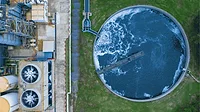EPA Honors Clean Water Innovations in Oregon and Idaho
The project included replacing deteriorating water lines with new PVC and HDPE pipes

Image via Sean Pavone from Getty Images Pro
Two rural communities in the Pacific Northwest have been recognized by the U.S. Environmental Protection Agency (EPA) for pioneering water infrastructure upgrades that balance innovation, affordability, and sustainability. On May 22, the Scravel Hill Water Co-op in Linn County, Oregon, and the City of Grand View, Idaho, each received EPA’s prestigious WATERS award, which honors exemplary water infrastructure projects funded through state revolving loan programs.
Scravel Hill Water Co-op: Rural Resilience in Oregon
The Scravel Hill Water Co-op, which serves about 300 people in Linn County, Oregon, was awarded for its effective use of a $1.7 million low-interest loan from Oregon’s Drinking Water State Revolving Fund. Administered jointly by the Oregon Health Authority (OHA) and Business Oregon, the fund enabled the co-op to overhaul aging infrastructure, including asbestos concrete piping more than 50 years old.
“EPA is pleased to recognize the Scravel Hill Water Co-op for their innovative efforts to provide clean water to residents,” said EPA Region 10 Administrator Emma Pokon. “The new infrastructure funded by EPA and Oregon’s Safe Drinking Water State Revolving Fund program will be more resilient and help the water system meet the requirements of the Safe Drinking Water Act.”
The project included replacing deteriorating water lines with new PVC and HDPE pipes, as well as installing natural gas-powered backup generators to ensure a continuous supply of clean water during power outages. With a 2.68% interest rate and $280,000 in principal forgiveness, the loan significantly eased the financial burden on the co-op’s members.
“Oregon Health Authority is proud to support Scravel Hill Water Co-op in making these critical upgrades,” said Samina Panwhar, section manager for Drinking Water Services at OHA. “Replacing aging infrastructure and adding emergency power generators will help ensure a safe and reliable water supply for the community.”
Grand View, Idaho: Building a Cleaner Future
Across state lines, the City of Grand View, Idaho, received its own WATERS award for wastewater treatment improvements funded by a $945,648 loan from Idaho’s Clean Water State Revolving Fund, managed by the Idaho Department of Environmental Quality (DEQ). The city also leveraged more than $2.3 million in American Rescue Plan Act funds allocated by Governor Brad Little.
“EPA is pleased to recognize the City of Grand View for their innovative efforts to provide clean water to residents,” said Pokon. “The wastewater treatment infrastructure funded by EPA and Idaho Department of Environmental Quality will be more energy efficient and help the city meet the requirements of the Clean Water Act.”
Grand View’s project includes a total containment lagoon, flood resiliency upgrades, and treatment system enhancements designed to support a growing population while improving environmental outcomes. The loan’s low 1.5% interest rate over 30 years will make the upgrades more affordable for residents.
“This project has been years in the making and will help the city protect human health and sustain economic growth,” said Idaho DEQ Director Jess Byrne. “DEQ has not only invested State Revolving Loan dollars in this project, but also significant federal recovery funds.”
EPA’s Vision: Water Innovation for All
Both award-winning projects reflect the core goals of the WATERS program, which recognizes infrastructure projects that are Well-planned, Affordable, Transferable, Efficient, Resilient, and Sustainable. These awards highlight how rural communities, often constrained by limited resources, are successfully leveraging state and federal programs to safeguard public health and future-proof their infrastructure.
“A core element of Business Oregon’s programs and services is helping communities plan and finance infrastructure improvements,” said Ed Tabor, Infrastructure and Program Services Director. “Scravel Hill Water Co-op’s project is a great example of a water system utilizing low-cost financing options to improve services to their community for the long-term.”
As repayments flow back into each state’s revolving fund, the cycle continues—fueling future upgrades for high-priority water projects across the region.
Looking for a reprint of this article?
From high-res PDFs to custom plaques, order your copy today!






